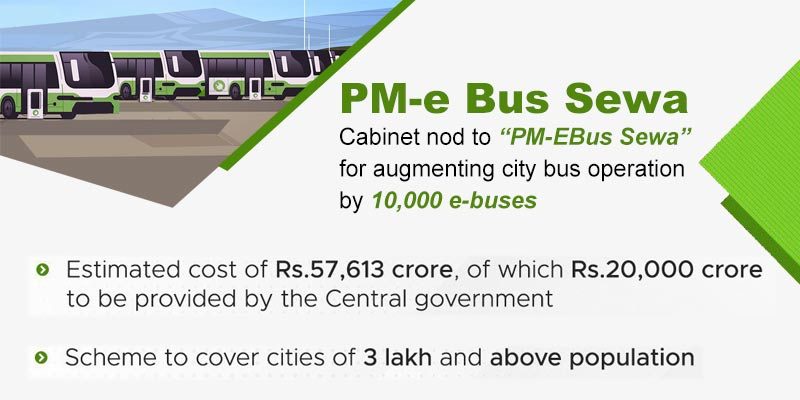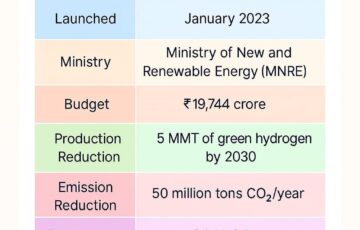PM-eBus Sewa Scheme Approved for 38,000 E-Buses
Why in the news?
The Union Cabinet approved the PM-eBus Sewa Scheme with a ₹3,435 crore outlay to deploy over 38,000 e-buses, reducing pollution and boosting public transport.
Addressing Challenges in E-Bus Adoption:
- Public Transport Authorities (PTAs) face challenges in adopting e-buses due to their high upfront cost and lower revenue realisation.
- PTAs will induct e-buses through a Public-Private Partnership (PPP) under the Gross Cost Contract (GCC) model, where OEMs/operators procure and operate the buses.
- To address concerns of payment defaults, the scheme ensures timely payments to OEMs/operators via a dedicated fund managed by CESL
Environmental and Economic Impact
- The transition to e-buses will significantly reduce pollution, greenhouse gas emissions, and fossil fuel consumption, making a positive environmental impact.
- The scheme promotes private sector participation and benefits all PTAs in States/UTs that opt for it, while supporting India’s efforts to reduce dependence on diesel/CNG buses.
About the PM-eBus Sewa Scheme:
- Deployment: 10,000 e-buses across cities to boost e-bus adoption.
- Operation: City bus operations will follow the Public Private Partnership (PPP) model for 10 years.
- Responsibility: States/cities manage bus services, payments; the Central Government provides subsidies.
Funding & Coverage
- Total Funding: ₹57,613 crore, with ₹20,000 crore from the Central Government and the rest from states.
- Coverage: Cities with 300,000+ population, including Union Territories, Northeast, and Hill States.
Scheme Segments
- City Bus Services & Infrastructure: Central Assistance for 10,000 electric buses on PPP model, bus depots, and power infrastructure.
- Green Urban Mobility Initiatives (GUMI): Projects to reduce GHG emissions, with support for the National Common Mobility Card (NCMC), fare collection systems, and bus priority infrastructure.
What is the National Common Mobility Card (NCMC)?
- NCMC offers integrated access for commuters across different public transport systems.
- The concept was proposed by the Nandan Nilekani committee, set up by the Reserve Bank of India (RBI).
- NCMC is an automatic fare collection system.
- It allows seamless payment for Metro, bus, and suburban railway services.
- The card will also turn smartphones into an inter-operable transport card, simplifying travel across various modes of public transport.
Sources Referred:
PIB, The Hindu, Indian Express, Hindustan Times





